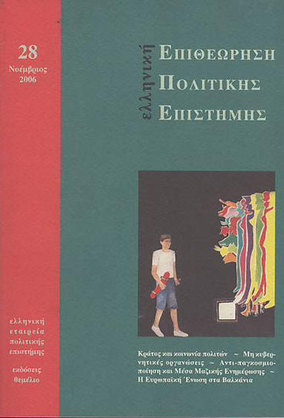Το τέλος του Ψυχρού Πολέμου : η πτώση της Σοβιετικής Ένωσης, η επανένωση της Γερμανίας και η νέα ευρωπαϊκή αρχιτεκτονική ασφαλείας
Part of : Ελληνική Επιθεώρηση Πολιτικής Επιστήμης ; No.5, 1995, pages 25-58
Issue:
Pages:
25-58
Parallel Title:
The end of the Cold War : the fall of the Soviet Union, the reunification of Germany and the new european security architecture
Author:
Abstract:
The purpose of this article is to provide a traditional Realist analysis of the historic changes that took place in the international system during 1989-93. The fall of the Soviet Union is linked to the strategic decisions of the Soviet leadership in the decade after 1975. In the mid-1970s the Soviet Union had reached the peak of its power and influence. It had achieved strategic parity with the United States, while its rival was in retreat after the Vietnam debacle. At this point the Soviet Union might have opted for normalisation of its international relations and economic reform at home, much as China is implementing today. Instead, the Soviet leadership pursued policies that posed threats to Western Europe, China and the United States, such as the SS-20 deployment programme and the invasion of Afghanistan. The consequence was a worldwide anti-Soviet reaction that included massive armaments programmes in China, Western Europe and the United States.Forced into a new armaments race against a far superior array of opponents, the Soviet Union exacerbated the internal economic imbalances of its command system and strained its economy to breaking point. The reformist leadership under Gorbachev was thus forced to improve external relations in order to be able to implement internal reform. Hence, when centrifugal forces emerged in the Warsaw Pact and the Soviet Union itself, military repression was virtually unviable in terms of the international distribution of power.Soviet weakness was the key factor in German unification as well. No Western power was in a position forcefully to block the tidal wave towards unification in East Germany, even though the prospect of a united Germany was unwelcome in London and Paris. The Soviet Union was unwilling and unable to deploy its army to suppress East Germany, a move that would have reignited the Cold War with disastrous consequences for the weak Soviet side. The end of the Cold War produced a security vacuum in Central and Eastern Europe, as well as in the southern periphery of the former Soviet Union. A number of regional conflicts broke out in the Balkans, the Caucasus and Central Asia. More widespread instability cannot be ruled out, should Russia be sucked into the security vacuum to reassert some of her old influence. Thus far, the un and the CSCE have proved incapable of providing security. The EU proved unable to cope with the Yugoslav crisis, though its enlargement policy has had a stabilising effect in other parts of Central and Eastern Europe. The weu is still a very weak military structure. Only nato seems likely to be in a position to act as a potent security organisation, should security collapse in Central and Eastern Europe. Nonetheless, NATO’s enlargement in that direction cannot but be a very long and incremental process, particularly in the light of Russian objections. Thus, for the immediate future the security architecture of Europe is weak, and wide-spread instability in Eastern Europe a real possibility.
Subject:
Subject (LC):
Keywords:
Ευρώπη, διεθνείς σχέσεις




